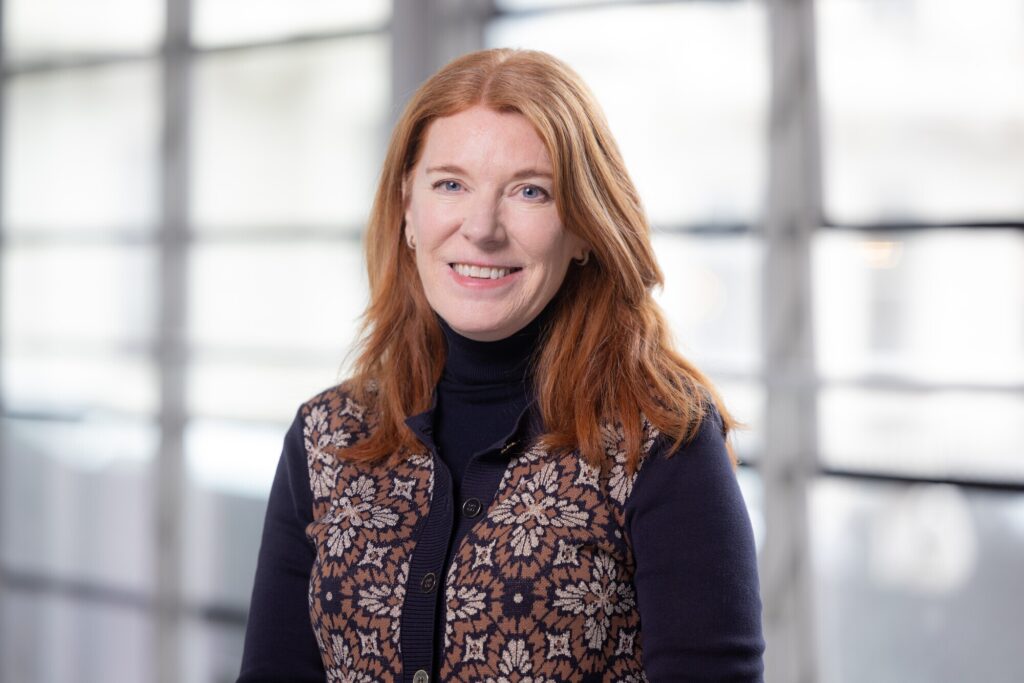
We are so pleased to have had the opportunity to talk to Grainne Brankin as she as she concludes two years as College Secretary & General Counsel at Imperial College London.
We hear how she welcomes the genuine collegiality from her peers across her institution and beyond and believes that this is vital to making it such a success. Her ‘outside’ voice has been sought at Imperial and has been embraced which demonstrates the positive and diverse approach that many institutions are looking to adopt.
Grainne was very thoughtful and keen to share advice and learnings to encourage others to consider higher education and bring their experience and knowledge to bear and evolve the sector for the future. We thank her so much for taking the time and consideration for this interview.
You joined Imperial as General Counsel and College Secretary in January 2022. Previously your experience was predominantly in the private sector – what observations would you share about the transition to the Higher Education sector?
My experience was all private sector, but fairly broad, as I’ve worked in law firms, listed companies and a private equity business as well as start-ups as a non-executive. So, when I thought about transitioning to Higher Education, I did consider that my extensive experience of different organisations and sectors would help.
I thought it would take me the first quarter to bed myself in, but I am happy to admit this has been a really steep learning curve. Higher education really is very different to the private sector. Revealingly, even thinking in calendar years and quarters is not a useful thing to do in this sector.
I had a recalibration and after the first year I felt like I had crossed a sort of line in terms of my understanding and feeling more at home in the sector. It really has taken me longer than I thought, and I am happy to share that to help set others’ expectations.
Everybody I have spoken to in other universities have been so open and really helpful but you quickly realise that each organisation is very different. I would usually look at parallel organisations and see what others were doing and learn about best practise. In private businesses there may be some differences around the edges, but operating models are often clearly defined and similar. In higher education each institution differs and the parallels, patterns and models can be harder to find and apply.
I continue to be encouraged and delighted by the genuinely collegiate atmosphere in the sector. Peers and others in the sector are generous with their time, knowledge and experience. There is a notion of joint enterprise: we’re all in higher education in the UK and it’s something that we all want to work towards improving.
What have you identified as challenges and opportunities coming to the sector as a leader from ‘outside’?
I would highlight three specific areas here. Firstly, diversity of thought, because one of the key things which is interesting in the higher education sector is that people stay in organisations a long time. When I really got my head around how long people expect to stay in roles and in institutions, it was really helpful to me because it drives a lot of behaviours and ways of thinking. We’ve got many members of staff who also studied here. It’s a hugely strong endorsement and gives them a perspective which is very interesting and valuable. They’ve got a sort of double stakeholder status, but it does also mean that there is a challenge overcoming some embedded cultural thinking.
Second, there is a clear opportunity in importing relevant best practice in areas such as corporate governance and ESG from public companies where these have had significant focus and investment. I have been able to share some of that knowledge from the outside which is starting to bring benefits to the team.
The third area is around leadership in a central services type role and how we maximise what is on offer through collaboration and support to ensure that the outcomes and education are of the highest possible quality. We need to ensure that the frameworks for delivery are clearly in place and that the purpose and objective of non-academic roles in universities are well understood and deliver the same quality of support and efficiency that would be demanded in the private sector.
We often describe top tier academic institutions as having complex management and governance structures. Is this a fair assessment, and what are your observations of the challenges in these areas?
That is a fair assessment, but actually the interesting question in my mind is whether that complexity is necessary. And I think there is a mixed answer to that.
It is more complex to run an organisation with members and very disparate public as well as individual key stakeholders rather than shareholders, staff, customers and suppliers. And to be fair, almost every organisation is looking beyond that to its more complicated stakeholder map. But, in higher education there is definitely a complexity which arises from the kind of community it is.
There perhaps is less time spent thinking about organisational design and structure. In a private organisation, often with change of ownership or leadership, people look at the organisation governance and structure. In a university I think less mind share is given typically to the whole organisation – it is more focused on smaller areas and independent departments in my experience so far. There isn’t such a strong centre of gravity around a ‘corporate HQ’.
I have spent a lot of time in the last year undertaking a governance effectiveness review at Imperial including trying to make things less complex. That has been a huge focus for me and colleagues have been really cooperative and willing to look at changes.
Your role involves much exposure to the board/Council as well as the executive – how does this relationship differ from other organisations you have worked for?
I think my relationship with them is actually quite similar, partly because at Imperial a lot of our independent council members have very strong corporate backgrounds.
We do also have a number of staff and student members and that is interesting, but it is not completely different to other organisations. The biggest challenge is to ensure that the Council and the university remain connected and have a good two-way information exchange so providing a really effective liaison and conduit is key.
There is one difference to other boards I have been on and that is remuneration as our Council members work pro bono so you are more conscious, I think, of using their time efficiently. I feel that the work and time of Council members requires more acknowledgement than it might on a Plc board.
You have a broad brief which no doubt requires you to interface across both academic and professional services communities at all levels. Are there specific challenges or observations you would share related to this dynamic?
There is this notion of a great divide but that isn’t what I have experienced at Imperial. There are many varied roles and skills required in our organisation but I don’t think we necessarily behave differently towards each other in a way that would create a different dynamic.
However, one thing that is interesting at Imperial is the impact of its academic success which is obviously positive, but I do think that creates an expectation of excellence in all areas which is also a challenge.
Part of the opportunity created by academic success is a huge amount of brand value that you can benefit from more broadly. For example, it makes it easier to attract good talent in the professional services teams. A raising of expectation and maybe a raising of that bar is really interesting. As is the trend towards people valuing highly the purpose and impact of their organisation, which is a uniting factor for academic and professional services colleagues.
What in your view are the key characteristics required in a leader in higher education today?
There are a few core characteristics across all sectors: skill, reliability, strategic thinking, empathy and hard work, for example. There is increasing demand for authenticity and that must be discussed and, even more importantly, demonstrated. It is no longer good enough to say you believe in something; it has to be proven and the value to people and the purpose of your organisation must be much more apparent.
In higher education a fundamental characteristic is patience, because the timelines are longer and that becomes really important when making decisions and being very thoughtful. However, this does need to be balanced with a sense of urgency for important projects and a desire and willingness to make decisions and move forward. I don’t think having infinite patience is an asset in the context of delivery. So we need to consider what’s the right level of patience? Where is the institution in its evolution? It’s an interesting balance and one that must be viewed carefully by leaders in this sector.
And finally, in higher education you don’t simply lead by management reports, there needs to be dialogue with the community and that requires skill and empathy in leaders.
What would you identify as the biggest threat to good leadership?
I think people are struggling all over. We are having to ask ourselves what is possible. Not just what do we want from staff but what are people prepared to give and how do we find a balance?
There are some very big challenges, from a resource and people perspective. Productivity is an issue and there are staff who want fundamental changes, beyond pay and working from home. It is a more holistic issue and there is not one single solution.
Biography
Grainne is a member of the University Management Board at Imperial, reporting to the President, and has overall responsibility for the Central Secretariat, Legal and Regulatory, Risk, Internal Audit and Governance functions. She also reports to the Chair of Council for Council matters and is a member of Court. Grainne’s legal career started as a corporate and intellectual property specialist at Clifford Chance LLP and Bird & Bird LLP and she has been General Counsel and member of the executive committee in various roles in the UK, France and Switzerland including at British Standards, Yahoo!, CBS and Centaur Media plc. As well as her expertise in governance, risk and compliance she has been a leader in strategic and organisational transformation programmes including change of ownership, restructures, digital transformation and group relocation. She has specific interests in diversity and inclusion, sustainability and technology/IP enabled businesses, which are also reflected in her non-executive roles at United Colleges Group, Oxford Executive Coaching and Siege FX.
